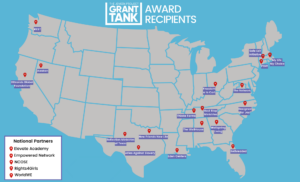This article originally appears in the ABA Journal. You can read it in its entirety here.
Rebekah Charleston didn’t say a word when she was arrested in 2006 and asked about the happenings in the Nevada home she shared with her trafficker and two other women.
She didn’t tell federal authorities she was forced into prostitution at age 17 and raped countless times. She didn’t tell them she had been both robbed and strangled at gunpoint and battered by violent men in hotel rooms across the country. Her trafficker, whom she first met in Texas, made sure of it.
“He made us get on the floor on our hands and knees in front of him,” Charleston says. “He would punch us in the face and say, ‘Bitch, what’s your name?’ We would have to say ‘lawyer.’ He would punch us in the face until we fell over and got back up. ‘Bitch, what’s your address?’ We would say ‘lawyer,’ and he would punch us in the face until we fell back over.
“It was literally beaten into us that the only word we were allowed to say was ‘lawyer.’”
Federal authorities arrested Charleston in connection with a prostitution investigation into her trafficker. Charleston refused to turn on him and was charged with conspiracy to commit tax evasion. She accepted a plea deal and spent 13 months in prison.
By the time she moved to Texas to restart her life at age 30, she had at least 10 arrests for theft, solicitation and trespassing, a large gap in employment history and almost $1 million of debt—largely due to her trafficker putting homes, cars and credit cards in her name and not paying the bills.
She went to college, earning both bachelor’s and master’s degrees in criminal justice, and now she serves as the executive director of Valiant Hearts, a North Texas nonprofit organization that seeks to end sexual exploitation.
Despite her success, Charleston found that life wasn’t without its struggles. Like many trafficking survivors with criminal records, she felt shame when forced to explain her history when applying for a job or when trying to find a place to live.
The Trafficking Victims Protection Act, the first federal anti-human trafficking law, was enacted in 2000, around the same time the international community formally recognized the issue. States soon followed with their own laws that largely focused on how to catch and prosecute traffickers.
But states failed to recognize that victims also got caught in the criminal justice system, often facing arrests and convictions for theft, drug possession, prostitution and other crimes that occurred during their trafficking.
In recent years, Hawaii, Nebraska and Nevada introduced laws to help trafficking survivors clear their records and overcome obstacles to employment, housing and education. Other states, including Connecticut, Kansas, New Jersey and New York, are moving forward with more proposed legislation.
“Generally, for women in prostitution, it began as children for them, and they stayed in because of all of those barriers to exiting exploitation and how hard it is, especially when you get a criminal record,” Charleston says. “You have a scarlet letter on your chest.
“People look at you from the outside and think, obviously, you are choosing to be there, you can get away anytime you want. But they have no idea how we get treated in public when we do get away.”
Defining the problem
Karen Countryman-Roswurm describes human trafficking as the commodification and exploitation of a person for the purpose of sex or labor. Despite a common misconception, it doesn’t even need to involve moving that person from one place to another.
“It’s that simple,” says Countryman-Roswurm, the executive director for the Center for Combating Human Trafficking at Wichita State University. “And I believe it’s on the continuum of violence, not so completely separate and siloed from other forms of violence.”
Continuing Reading on ABAJournal.com
This article ran in the February-March 2020 issue of the ABA Journal under the headline: “Finding Relief: States help trafficking survivors overcome criminal records“






